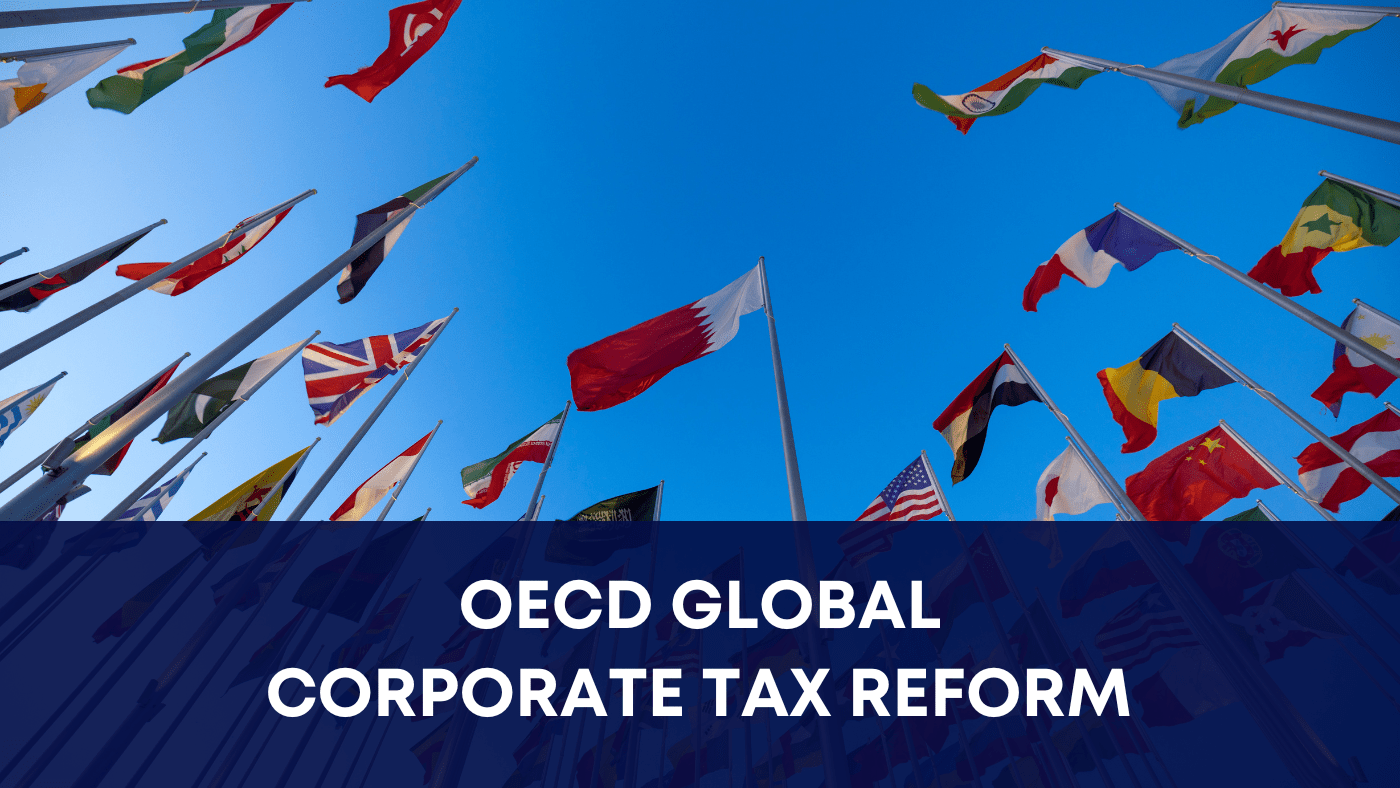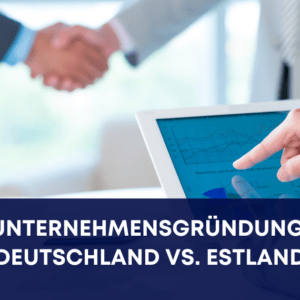OECD Global Corporate Tax Reform and Effect of 15% Minimum Corporate Tax to e-Residents

Since 2024, the large groups are subject to the minimum global corporate income tax of 15%. This minimum tax is one of the two pillars under the global tax reform of the OECD and G20 framework for inclusive tax reform on base erosion and profit shifting (BEPS), adopted in the EU legislation through the EU Council Directive from 2022. Estonia has joined the Statement on the Two-Pillar Solution to Address the Tax Challenges Arising from the Digitalisation of the Economy already in 2021. This article discusses the substance of both pillars of that reform, how the EU is implementing the global agreement and how it affects Estonia and the e-Residents.
Pillar One – the Partial Re-allocation of Taxing Rights
Pillar One aims to adapt the international rules on how the taxation of corporate profits of the largest and most profitable MNEs is shared amongst countries, to reflect the changing nature of business models, including the ability of companies to do business without a physical presence.
The companies affected by this reform are multinational enterprises (MNEs) with global turnover above 20 billion euros and profitability (PBT/revenue) above 10%.
The Pillar One mechanism envisages a redistribution of a share of excess profits of MNEs to market jurisdictions where consumers or users are located. According to the agreement, jurisdictions will receive a part of the reallocated profits if the MNEs involved derive at least EUR 1 million in revenue from that jurisdiction. For smaller jurisdictions, with a GDP lower than EUR 40 billion, the amount of revenue derived will be set at EUR 250,000. The share of profits to be reallocated to market jurisdictions based on particular formula will be between 20% and 30% of the ‘residual profits’ of companies in scope, which would be defined as profits above 10% return on sales.
Once agreed and translated into a multilateral convention, the application of Pillar One will be mandatory for participating countries (as at February 2025 – 139 jurisdictions).
Pillar Two – Global Minimum Effective Tax 15%
Pillar Two aims at ensuring that multinational businesses are subject to a minimum effective level of tax on all of their profits each year. The global minimum effective tax rate is 15%. Pillar Two would apply to all multinational groups exceeding a threshold of EUR 750 million of combined financial revenues, subject to transposition to the national legislation.
Where an MNE has a subsidiary in lower-taxed country, the parent entity of a MNE would be subject to a top-up tax (Income Inclusion Rule, IIR) to make up for the low taxation of such subsidiaries in another country. If MNE is headquartered in a country that does not impose top-up tax on the parent company, their low-taxed subsidiaries will still effectively lose their tax advantages due to the so-called Undertaxed Payments Rule (UTPR), which denies deductions or requires an equivalent adjustment to the extent the low tax income is not subject to a top-up tax.
OECD/G20 Inclusive Framework on BEPS members are not required to adopt the rules, but if they choose to do so, they will have to implement and administer the rules in a way that is consistent with the agreed outcomes under Pillar Two. It also means that Inclusive Framework members will have to accept that other members apply the rules, which in practice implies that multinational enterprises with subsidiaries in countries that operate a rate below the agreed minimum will not avoid bearing the consequences of Pillar Two.
Implementation of Pillar Two in the European Union
In order to ensure that the global agreement regarding Pillar Two is implemented in a consistent way across the EU Member States, the Council of the European Union has adopted a Directive for establishing common measures for the minimum effective taxation of multinational enterprise (MNE) on 14 December 2022, that needed to be transposed by the Member States by the end of 2023.
Accordingly, the effective tax rate is calculated per jurisdiction by dividing covered taxes paid by the entities in the jurisdiction by their qualifying income. If the effective tax rate for the entities in a particular jurisdiction is below the 15% minimum, then the Pillar Two rules are triggered and the group must pay a top-up tax to bring its rate up to 15%. The calculations shall normally be made by the ultimate parent entity of the group unless the group designates another entity of the group.
If the global minimum tax is not imposed by a low-taxed non-EU country where a group entity is based, Member States where the group is located shall collect the top-up tax from the entities of the group in its territory that is determined based on the domestic entities’ ownership percentage in the foreign low-taxed group entity, employees and assets.
Adoption of Minimum Tax Rules in Estonia
Estonia has opted for an exemption available to small countries (to countries with fewer than 12 ultimate parent entities of large MNEs), allowing such countries not to apply the minimum tax for the first six years, i.e. until 2030. It is expected that the exemption will be implemented in Estonia at least for the first years, however subject to the decision of the Estonian Government and Parliament.
Regardless, the ultimate parent entities of the MNEs located in Estonia shall designate one subsidiary in the country applying the minimum tax, which will file the minimum tax return for the group. In this case, the subsidiary will be subject to the legislation of the country of its residence transposing the Minimum Tax Directive or the OECD model rules. The ultimate parent company of a multinational group established in Estonia is obliged to provide the information necessary for the filing of the return to that subsidiary. If a subsidiary of a multinational group is established in Estonia, the ultimate parent company of the group will generally file a minimum tax return in accordance with the law of its country of establishment.
Thereby, even if Estonia makes use of the exemption, it does not relieve Estonian-based MNEs from the obligation to pay the minimum tax in other countries, but it reduces the administrative burden for Estonia and the tax administration.
In order to avoid a minimum tax liability in another country, Estonian companies can distribute more profits in Estonia so that the effective tax rate is at least 15%. With the income tax rate of 22%, 53.18% of the profits would have to be distributed in order to achieve an effective tax rate of 15%.
According to the Estonian Tax and Customs Board, there are 5 ultimate parent companies and about 350 subsidiaries in Estonia, which belong to a large multinational group. About half of those subsidiaries are not subject to minimum taxation under the de minimis exception, which exempts the subsidiaries whose turnover in Estonia does not exceed EUR 10 million and a profit of EUR 1 million. For example, a foreign group of companies that has only one subsidiary in Estonia with figures below these limits does not have to calculate or pay a minimum tax on the profits of an Estonian company. If there are several subsidiaries and their aggregated economic performance exceeds the limits, the exception does not apply.
At the company’s level, current Estonian income tax system will remain in place, i.e. the tax liability only arises upon distribution of the profits.
Effect on e-Residents and their companies
Provided the rules target the MNEs, incl. those with subsidiaries in Estonia, the e-Residents’ companies should not be affected by the reform.
Sources:
Statement on a Two-Pillar Solution to Address the Tax Challenges Arising from the Digitalisation of the Economy, 08.10.2021 https://www.oecd.org/tax/beps/statement-on-a-two-pillar-solution-to-address-the-tax-challenges-arising-from-the-digitalisation-of-the-economy-october-2021.pdf
OECD. Global Minimum Tax https://www.oecd.org/en/topics/sub-issues/global-minimum-tax.html
OECD Global Agreement on Corporate Taxation: Frequently asked questions https://ec.europa.eu/commission/presscorner/detail/en/qanda_21_3564
COUNCIL DIRECTIVE (EU) 2022/2523 of 14 December 2022 on ensuring a global minimum level of taxation for multinational enterprise groups and large-scale domestic groups in the Union https://eur-lex.europa.eu/legal-content/EN/TXT/?uri=CELEX%3A02022L2523-20221222
European Commission. Minimum Corporate Taxation https://taxation-customs.ec.europa.eu/taxation/business-taxation/minimum-corporate-taxation_en
Ministry of Finance. EU Minimum Tax Directive https://fin.ee/riigi-rahandus-ja-maksud/maksu-ja-tollipoliitika/algatused#el-miinimummaksu-dir




 Schedule a call
Schedule a call
 Send a message
Send a message